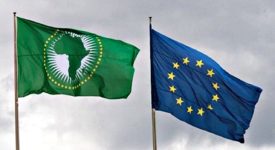The European Commission has earmarked 140 million euros to fund five development projects for the Republic of Guinea. Following the peaceful elections held on 28 September 2013, the European Union resumed full cooperation with this african country and released the funds from the 10th EDF (European Development Fund) (2008 2013).
The money will be used to support the Guinean Government’s efforts made to promote good governance, protect human rights and improve mobility and road infrastructure.
“The European Union is committed to supporting the Guinean Government’s efforts in finding its way back to sustainable and fair growth. The success of the projects planned for the benefit of the population is guaranteed by the strengthening of national capabilities and a participatory approach”, said Andris Piebalgs, Member of the European Commission in charge of Development.
Mr Piebalgs will sign in Brussels with Guinea’s State Minister for Economy and Finance, Mr Kerfalla YANSANE, an agreement related to the European Union financial contributions to five major development projects in Guinea.
The EU supports the “Project for the Transport Sector” (PAST) with a € 83 million contribution. The project seeks to provide sustained improvement to the level of service of the road network, to promote reform of the rules and organization of road transport and to integrate land-use and town development considerations in policy-making and transport planning.
This project will also upgrade the national road network between Kissidougou and Guéckédou, opening up the forest region, which is one of Guinea’s agricultural and mining hubs.
The EU also backs justice sector reform (PARJU) in Guinea with a 20 million euro input. The PARJU program supports the Government’s efforts in promoting democratic principles, respect for human rights, justice and the fight against impunity in the country.
This program is expected to improve the quality of public service in the field of justice and reform of the prison system. Another Guinean program seeking to carry out reforms in the security sector will also benefit from EU backing. Dubbed “strand 2”, this €15 million program aims to support the Government’s efforts made to consolidate the rule of law, governance, promoting democratic principles and protecting human rights.
The goal of this program is to help set up and maintain a peaceful social, economic and political climate by improving the country’s security.
The EU supports likewise the reform of public finances injecting € 12 millions in a program expected to improve economic and financial governance, streamline the country’s public financial accountability, and improve internal revenue and the institutional capabilities of the Guinean ministry of Finance.
The EU also backs the Guinean government decentralization efforts allocating 10 million euros to a program aiming to bring the public services closer to citizens and promote local democracy.
Cooperation with Guinea had been suspended following the coup in December 2008 (except for humanitarian and emergency aid, direct assistance to the population and measures to accompany the democratic transition).
Following the 2010 presidential election, the road map which emerged from the crisis was amended and the European Union gradually resumed its cooperation with Guinea.
Article Tags:
Andris Piebalgs · Brussels · EC · EDF · EU · Guéckédou · Guinea · Kerfalla YANSANE · Kissidougou · PARJU · PAST






